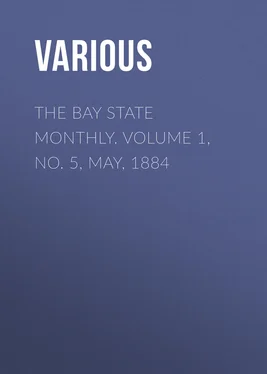Various - The Bay State Monthly. Volume 1, No. 5, May, 1884
Здесь есть возможность читать онлайн «Various - The Bay State Monthly. Volume 1, No. 5, May, 1884» — ознакомительный отрывок электронной книги совершенно бесплатно, а после прочтения отрывка купить полную версию. В некоторых случаях можно слушать аудио, скачать через торрент в формате fb2 и присутствует краткое содержание. Жанр: foreign_antique, periodic, foreign_edu, на английском языке. Описание произведения, (предисловие) а так же отзывы посетителей доступны на портале библиотеки ЛибКат.
- Название:The Bay State Monthly. Volume 1, No. 5, May, 1884
- Автор:
- Жанр:
- Год:неизвестен
- ISBN:нет данных
- Рейтинг книги:4 / 5. Голосов: 1
-
Избранное:Добавить в избранное
- Отзывы:
-
Ваша оценка:
- 80
- 1
- 2
- 3
- 4
- 5
The Bay State Monthly. Volume 1, No. 5, May, 1884: краткое содержание, описание и аннотация
Предлагаем к чтению аннотацию, описание, краткое содержание или предисловие (зависит от того, что написал сам автор книги «The Bay State Monthly. Volume 1, No. 5, May, 1884»). Если вы не нашли необходимую информацию о книге — напишите в комментариях, мы постараемся отыскать её.
The Bay State Monthly. Volume 1, No. 5, May, 1884 — читать онлайн ознакомительный отрывок
Ниже представлен текст книги, разбитый по страницам. Система сохранения места последней прочитанной страницы, позволяет с удобством читать онлайн бесплатно книгу «The Bay State Monthly. Volume 1, No. 5, May, 1884», без необходимости каждый раз заново искать на чём Вы остановились. Поставьте закладку, и сможете в любой момент перейти на страницу, на которой закончили чтение.
Интервал:
Закладка:
As President Arthur read his message his voice trembled, but his manner was impressive, and the eyes of many present were moistened with tears. The first one to congratulate him when he had concluded was Chief Justice Waite, and the next was Secretary Blaine. After shaking him by the hand, those present left the room, which was closed to all except the members of the Cabinet, who there held their first conference with the President. At this cabinet meeting the following proclamation was prepared and signed by President Arthur, designating the following Monday as a day of fasting, humiliation, and prayer:—
By the President of the United States of America;
Whereas, in his inscrutable wisdom, it has pleased God to remove from us the illustrious head of the Nation, James A. Garfield, late President of the United States; and whereas it is fitting that the deep grief which fills all hearts should manifest itself with one accord toward the throne of infinite grace, and that we should bow before the Almighty and seek from him that consolation in our affliction and that sanctification of our loss which he is able and willing to vouchsafe:
Now, therefore, in obedience to sacred duty, and in accordance with the desire of the people, I, Chester A. Arthur, President of the United States of America, do hereby appoint Monday next, the twenty-sixth day of September, on which day the remains of our honored and beloved dead will be consigned to their last resting-place on earth; to be observed throughout the United States as a day of humiliation and mourning; and I earnestly recommend all the people to assemble on that day in their respective places of divine worship, there to render alike their tribute of sorrowful submission to the will of Almighty God and of reverence and love for the memory and character of our late Chief Magistrate.
[SEAL.]In witness whereof I have hereunto set my hand and caused the seal of the United States to be affixed.
Done at the city of Washington, the twenty-second day of September, in the year of our Lord 1881, and of the independence of the United States the one hundred and sixth.
CHESTER A. ARTHUR.
By the President:
JAMES G. BLAINE. Secretary of State.
President Arthur soon showed his appreciation of the responsibilities of his new office. Knowing principles rather than persons, he subordinated individual preferences and prejudices to a well-defined public policy. While he was, as he always had been, a Republican, he had no sympathy for blind devotion to party; he had "no friends to reward, no enemies to punish;"—and he has been governed by those principles of liberty and equality which he inherited. His messages to Congress have been universally commended, and even unfriendly critics have pronounced them careful and well-matured documents. Their tone is more frank and direct than is customary in such papers, and their recommendations, extensive and varied as they have been, show that he has patiently reviewed the field of labor so sadly and so unexpectedly opened before him, and that he was not inclined to shirk the constitutional duty of aiding Congress by his suggestions and advice. An honest man, who believes in his own principles, who follows his own convictions, and who never hesitates to avow his sentiments, he has given his views in accordance with his deliberate ideas of right.
The foreign relations of the United States have been conducted by Secretary Frelinghuysen, under the President's direction, in a friendly spirit and when practicable with a view to mutual commercial advantages. He has taken a conservative view of the management of the public debt, approving all the important suggestions of the secretary of the treasury, and recognizing the proper protection of American industry. He is in favor of the great interests of labor, and opposed to such tinkering with the tariff as will make vain the toil of the industrious farmer, paralyze the arm of the sturdy mechanic, strike down the hand of the hardy laborer, stop the spindle, hush the loom, extinguish the furnace-fires, and degrade all independent toilers to the level of the poor in other lands. The architect of his own fortune, he has a strong and abiding sympathy for those bread-winners who struggle against poverty.
The reform of the civil service has met with President Arthur's earnest support, and his messages show that every department of the government has received his careful administration. Following the example of Washington, he has personally visited several sections of the United States, and has especially made himself acquainted with the great problem of Indian civilization.
President Arthur's administration has been characterized by an elevated tone at home and abroad. All important questions have been carefully discussed at the council table, at which the President has displayed unusual powers of analysis and comprehension. The conflicting claims of applicants for appointments to offices in his gift, have been carefully weighed, and no action has been taken until all parties interested have had a hearing. The President has a remarkable insight into men, promptly estimating character with an accuracy that makes it a difficult matter to deceive him, or to win his favor either for visionary schemes, corrupt attacks upon the treasury, or incompetent place-hunters. He has shown that he has been guided by a wise experience of the past, and a sagacious foresight of the future, exhibiting sacrifices of individual friendship to a sense of public duty.
Possessing moral firmness and a just self-reliance, President Arthur did not hesitate about vetoing the "Chinese Bill" and the "Bill making appropriations for rivers and harbors" for reasons which he laid before Congress in his veto messages. The wisdom and sagacity which he has displayed in his management of national affairs has been especially acceptable to the business interests of the country. They have tested his administration by business principles, and they feel that, so long as he firmly grasps the helm of the ship of state, she will pursue a course of peace and prosperity.
In dispensing the hospitalities of the White House, President Arthur has exhibited the resources of a naturally generous disposition and a refined taste. His remembrance of persons who call upon him, and whom he may not have seen for years, is remarkable, and his hearty, genial temperament enables him to make his visitors at home. His vigorous vitality of body and mind, his manly figure and expressive face, add to the dignity of his manner. A ready speaker, he at all times rises to the level of an emergency, and he invariably charms those who hear him by his courtesy of expression, which is the outward reflection of a large, kind heart.
President Arthur's numerous friends contemplate the prominent events of his eventful life without regret, and with a sincere belief that they will be sustained by the verdict of impartial history. Utility to the country has been the rule of his political life, and he has arrived at that high standard of official excellence which prevailed in the early days of the Republic, when honesty, firmness, patriotism, and stability of character were the characteristics of public men. Under his lead, the Republican party, disorganized and disheartened after the sad death of General Garfield, has gradually become strengthened and united on the eve of another presidential victory.
YESTERDAY
Adown the aisles of yesterday
What fairy notes are ringing,
And strange, sweet odors, rich and rare,
The western winds are bringing!
The deeds we counted poor and mean,
Now shine with added glory,
And like a romance, reads the page
Of life's poor, meagre story.
Интервал:
Закладка:
Похожие книги на «The Bay State Monthly. Volume 1, No. 5, May, 1884»
Представляем Вашему вниманию похожие книги на «The Bay State Monthly. Volume 1, No. 5, May, 1884» списком для выбора. Мы отобрали схожую по названию и смыслу литературу в надежде предоставить читателям больше вариантов отыскать новые, интересные, ещё непрочитанные произведения.
Обсуждение, отзывы о книге «The Bay State Monthly. Volume 1, No. 5, May, 1884» и просто собственные мнения читателей. Оставьте ваши комментарии, напишите, что Вы думаете о произведении, его смысле или главных героях. Укажите что конкретно понравилось, а что нет, и почему Вы так считаете.












